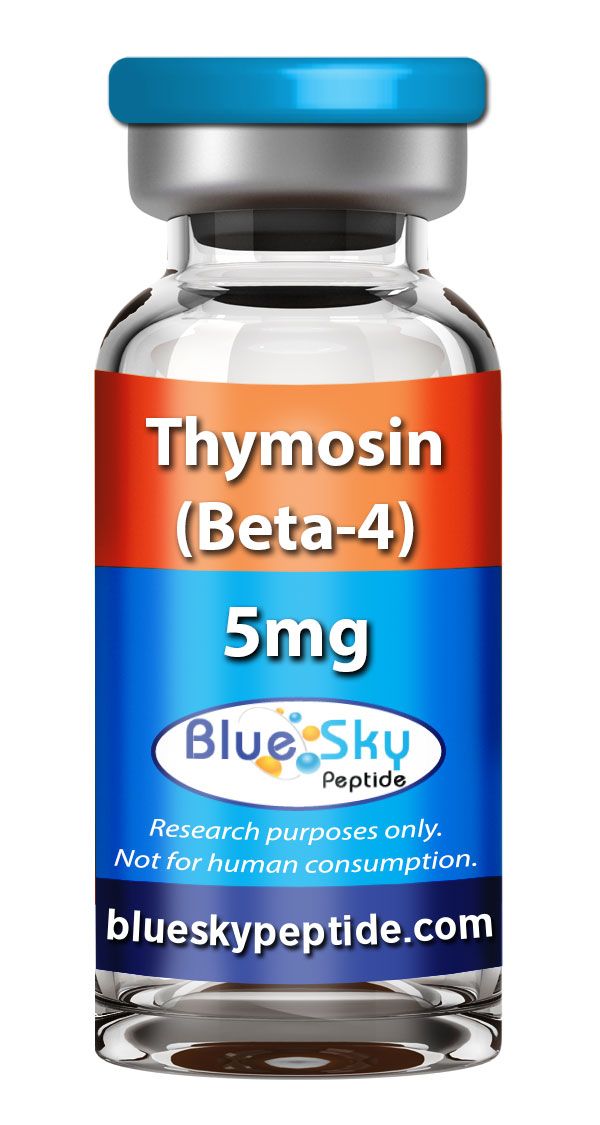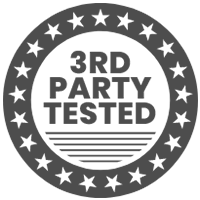
Thymosin Beta 4 (TB500) 5mg
Out of Stock
- Free Priority Shipping
- With Purchase over $99 | USA ONLY
Buy Thymosin Beta 4 (TB500) 5MG :
| Unit Size | 5 mg/ vial |
| Unit Quantity | 1 vial |
| Purity (Mass Spectrometry and UV) | 99.87% |
| Sequence | Ac-Ser-Asp-Lys-Pro-Asp-Met-Ala-Glu-Ile-Glu-Lys-Phe-Asp-Lys-Ser- Lys-Leu-Lys-Lys-Thr-Glu-Thr-Gln-Glu-Lys-Asn-Pro-Leu-Pro-Ser-Lys- Glu-Thr-Ile-Glu-Gln-Glu-Lys- Gln-Ala-Gly-Glu-Ser-OH |
| Molecular Formula | C212H350N56O78S |
| Appearance | Lyophilized White Powder |
| Source | Chemical Synthesis |
| Storage | Lyophilized TB500 is stable at room Temperature for 90 days, however it is best to store in a freezer below - 8c for any extended period of time. |
| Terms | The products we offer are intended for laboratory research use only. Please familiarize yourself with our terms of service prior to ordering. |
Thymosin Beta-4 (TB-4) Peptide for In Vitro Research – Thymosin beta-4, also known as TB-4, is a naturally occurring peptide found in all body cells except red blood cells (erythrocytes). Comprising 43 amino acids and with a molecular weight of 4.9 kDa, TB-4 binds to the G-actin cytoskeleton, promoting cell migration, proliferation, and differentiation, which are essential in wound healing and tissue regeneration research.1 This peptide is highly concentrated at injury sites, released by platelets and macrophages to support the body’s first response to injury.2
Due to its mobilizing and angiogenic properties, thymosin beta-4 is a popular peptide in controlled in vitro and in vivo models for cardiac injury, ischemia, stroke, liver fibrosis, and corneal healing research.2 Both chemically synthesized and recombinant forms of thymosin beta-4 are utilized strictly in laboratory environments. For example, in coronary ligation studies using mice, TB-4 has been observed to interact with Akt and integrin-linked kinase (ILK), supporting cardiomyocyte mobility and survival, which may enhance heart function.1
In liver fibrosis research, an in vitro study using hematopoietic stem cells (HSCs) demonstrated that exogenous thymosin beta-4 could inhibit HSC proliferation, potentially mitigating fibrosis progression. The findings underscore the peptide's research relevance, though further studies are required to understand its full effects.3 Additionally, in corneal injury models, TB-4 has been shown to aid cell migration and differentiation in avascular tissues, supporting wound healing without fibrosis.4
Product Information: Thymosin beta-4 (TB-4) is provided as a lyophilized white powder in 5 mg vials and is intended exclusively for in vitro laboratory research. It is not suitable for human or animal use outside controlled research settings.
References:
1. Aronson JK. (2016). Thymic hormones. In Aronson’s Meyler’s Side Effects of Drugs. doi: 10.1016/B978-0-444-53717-1.00190-6.
2. Kleinman HK, Sosne G. (2016). Thymosins. In Litwack G (Ed.) Vitamins and Hormones (pp. 251-275). Elsevier. doi: 10.1016/bs.vh.2016.04.005.
3. Kim J, Jung Y. (2016). Thymosin Beta 4 Is a Potential Regulator of Hepatic Stellate Cells. In Litwack G (Ed). Vitamins and Hormones (pp 121-149). Elsevier. doi: 10.1016/bs.vh.2016.04.011.
4. Sosne G, Qiu P, Kurpakus-Wheater M. Thymosin beta 4: A novel corneal wound healing and anti-inflammatory agent. Clin Ophthalmol. 2007 Sep;1(3):201-207.


